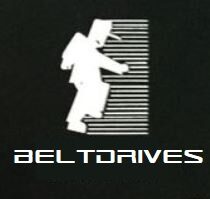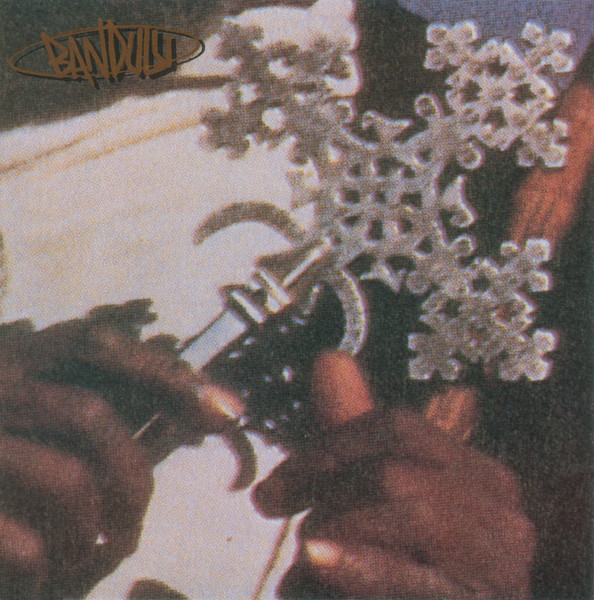Antimatters – Bandulu – Released July 17th, 1994, Infonet
Antimatters is the second studio album from British techno trio Bandulu, which was released on their Infonet label in 1994.
Bandulu was formed by London trio Jamie Bissmire, John O’Connell and Lucien Thompson. Their name comes from a Jamaican slang for a criminal or gangster and the group’s overall vibe and aesthetic was a product of their main influences, Jamaican soundsystem culture, Detroit techno and hiphop (hence the graffiti style logo).
While their 1993 debut Guidance had more of a Detroit feel, with additional tribal flourishes, Antimatters dug deeper into dub territory.
In a way, Antimatters was a reflection of what was happening in techno at the time, particularly in Germany, though Bandulu’s music always seemed to exist within its own bubble. And I imagine that, even if they had deliberately tried to emulate the likes of Basic Channel, their own idiosyncrasies would have been far too prominent.
In other words, Bandulu sounds like Bandulu. And although it’s easy to lump Bandulu in with others in the dub techno genre, they don’t slot in there as readily as others.
They’re always going to be their own thing.
Part of that is due to London’s Caribbean population and soundsystem culture. Sure, there are plenty of people in Germany running soundsystems, but there’s a reason the UK invented jungle, UK garage and dubstep. Not to mention all those crossover groups like Leftfield, The Orb and Dreadzone.
Given that rich heritage, a dub techno group with a uniquely London vibe was inevitable.
And, for me, Antimatters was where the group truly hit their stride.
Review A Gwarn
The album begins with the track Agent Jah, an extended ten minute bass excursion which is firmly rooted in dub, but at the same time is undeniably techno.
And yet, because it’s worlds apart from what was happening in Berlin at the time, you can’t necessarily call it dub techno. Perhaps natty techno might be more appropriate.
My next pick from the album is track four, High Rise Heaven. In some ways this one sounds more like the material from the previous album, with more native “intelligent” sounds one might associate with the likes of B12, or other material from Warp’s Artificial Intelligence series.
At the same time one also can’t ignore that hefty percussion, which exists in its own strange portal dimension connecting the original junglist sounds of Fabio and Grooverider with the lysergic tribal sounds of Fabio Paras.
But once again, any such comparisons are tenuous at best, since Bandulu always do their own thing.
Phaze In Remix is easily the most Maurizian of them all, with a distinctly Germanic influence, but again those influences can only stretch so far before that irrepressible Bandulu spirit comes to the fore.
If you’re waiting for a beat to kick in, don’t. This sprawling feedback loop is completely beatless, though it’s even more of a stretch to call this ambient.
Personally, I like to think of it as more of an extended aural pallet cleanser designed to wash out the speakers before we get to the album’s main event…
And that main event is Presence, one of the finest techno tracks from 1994 and hands done one of my favourite techno tracks of all time.
This one was made specifically for the dancefloor and 30 years on, still has the ability to obliterate it. In theory, it’s a fairly simple piece of music; an eight-bar earworm melody, looped for around eight and a half minutes, straddling a steady four to the four kick.
But it’s the accompanying scattershot percussion that generates the track’s intensity as it snaps, twists and flexes, cobra-like, distorted, filtered and mangled, drenched in feedback and delay, coiling around your ears while that steady kick drum keeps driving you ever forward…
It’s a masterclass in achieving perpetual momentum through minimalist sound design.
Next up I’m picking track nine, Original Scientist. This one’s another 50/50 dub and techno split and has that same rich percussive effect as Presence, albeit at a slower tempo. Once again this one is designed to be played at high volumes. And once you reach the necessary decibel threshold the overall effect is like an electric toothbrush scrubbing your cochlea.
My final pick from the album is track 11, Run Run. This is more of a downtempo track, but it’s also still quite dubby, topped off with vocals, “run run run, revolution come.”
Played this one a lot back in the day and always results in a smile of nostalgia.
Original Scientists
Antimatters runs the gamut of dance and dubby sounds from sharp stepping beats to experimental Detroit futurism, Teutonic techno assaults to the slow and steady skanking of Run Run.
If you’re the type who likes to pick and mix tracks for playlists, you’ll find plenty that are ideal for chilling at home alongside blazing hot bangers guaranteed to rip the dancefloor a new one, despite being three decades old and counting.
But the best way to enjoy this is as it was intended. In terms of tone and range Antimatters is a diverse yet balanced album and also, sadly, a criminally underrated one.
Antimatters also serves as the perfect introduction for the uninitiated. There’s plenty here for both technoheads and dub fans alike to enjoy plus an extensive back catalogue of similar quality releases to enjoy when you’re done.
Embrace the soundclash.

